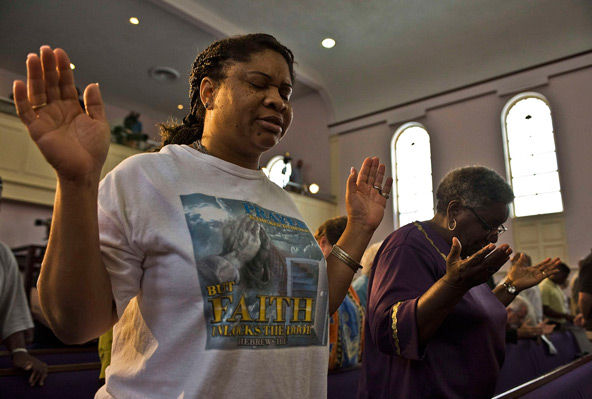

WASHINGTON (CNS) — In highly personal comments July 19, President Barack Obama encouraged people to do some soul-searching, and for families, churches and workplaces to have conversations about race.
And, in a blog piece for U.S. Catholic magazine, a Wisconsin priest wrote of similarly personal feelings about the verdict in the George Zimmerman trial and tried to explain his own reactions to it.
Father Bryan Massingale, a priest of the Archdiocese of Milwaukee and a professor of theology at Marquette University, wrote of the “nonconscious inability of many white Americans to connect with, much less have empathy for, the experience of their fellow citizens with black skin. The Zimmerman verdict points to a profound deficit of what Catholic social teaching calls ‘solidarity,’ that is, the conviction that ‘they’ are ‘us.’ In biblical language, this verdict demonstrates the tragic consequences of failing to see those of a different hue as being our ‘neighbor.'”
Obama’s unannounced remarks in the White House press room came as protests continued around the country — objecting to a Florida jury’s July 13 acquittal of Zimmerman in the death of Trayvon Martin and also to the sense that whites and blacks in the United States have highly different understandings of the role of racism in the country.
Obama told of his own experiences of hearing car doors being locked as he walked past on the street and of being followed as he shopped in department stores, and of other ways in which blacks are treated with suspicion or fear.
“There are very few African-Americans who haven’t had the experience of getting on an elevator and a woman clutching her purse nervously and holding her breath until she had a chance to get off,” Obama said. “That happens often.
“And I don’t want to exaggerate this, but those sets of experiences inform how the African-American community interprets what happened one night in Florida,” he said, as he sought to explain why the case resonates differently with blacks than it does with whites.
Obama said he was not going to weigh in on the legal issues of the case, adding that law enforcement issues are traditionally a matter for state and local authorities, and that he was leaving it up to Attorney General Eric Holder to consider whether the Justice Department had a role in other angles. Holder said earlier that his agency would investigate whether there are grounds for charges of civil rights violations in the case.
Instead, Obama outlined a handful of general ideas for how the country might be vigilant in dealing with the lingering disparity in how people are treated. And he noted that he does see improvement in attitudes about race, particularly in how his teen-age daughters and their friends interact.
Father Massingale, the author of “Racial Justice and the Catholic Church,” who also is African-American, said he has had “the blues,” since the Zimmerman verdict, “for I know what it feels like to be a black man in America, regardless of the impassioned denials of so many that race had nothing to do with this case.
“I, too, have been profiled by police officers, followed by campus safety patrols and stalked by mall security guards for doing nothing more than walking to my office, shopping for clothes, or enjoying an evening stroll — for just minding my own business,” Father Massingale wrote. “Once, while walking on a busy and well-lit street at night, I was abruptly stopped by the police, rudely questioned and roughly searched, under the suspicion that I was the perpetrator of a robbery — only to later discover that the only characteristic I shared with the actual criminal was the pigmentation of our skin, he being much younger, shorter, and heavier than I.
“This happened despite my being a priest, a university professor, and a respected member of the community (or so I would have thought). The police offered no apology. Nor, to be honest, did I really expect one. Living with such terror and indignity is to be expected.”
“You don’t have to wear a hoodie or sagging pants to be perceived as a threat,” the priest continued. “The very presence of a black man in any space that violates the expectations of those in authority can constitute sufficient probable cause for suspicion and danger. This is why the verdict of ‘not guilty’ has touched a deep well of resentment, sadness and horror in many African-American men (and in those who love us).”
Father Massingale said there’s a “more or less unconscious racial bias” that associates “black” with criminality. “Social scientists call such bias ‘racially selective sympathy and indifference.'”
Noting that some people have said Martin’s actions contributed to the situation that ended with him being killed when Zimmerman confronted him, the priest said that he and other African-American men make ongoing calculations about how to behave in various situations.
“Too often I also have been saddled with the responsibility for managing white people’s fear and anxiety, charged with going the extra mile to assure them that I am not a threat,” he wrote, explaining that’s why his sadness is tinged with anger. “Why must I bear the burden of deciding if I should walk in this neighborhood, or wear certain clothes, or talk in a raised voice, in order to satisfy the fear that is unjustly assigned to me?”
– – –
By Patricia Zapor, Catholic News Service.






